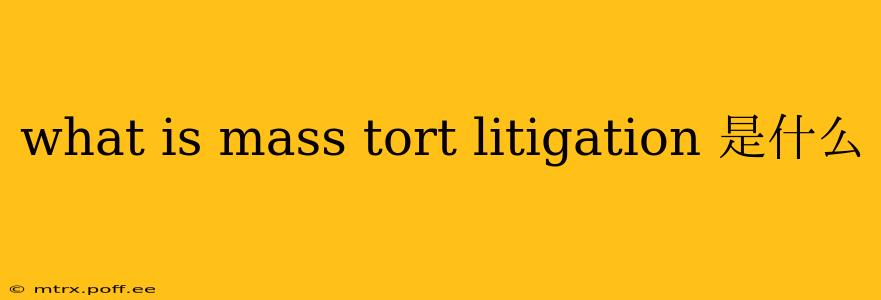What is Mass Tort Litigation? Understanding the Complexities of Multi-Party Lawsuits
Mass tort litigation refers to a group of lawsuits arising from a single event, product, or conduct causing widespread harm. Unlike class-action lawsuits, which require plaintiffs to share similar legal claims, mass torts involve individual claims with common factual issues. This key difference significantly impacts how these cases are handled and the potential outcomes for those involved. This article delves into the intricacies of mass tort litigation, exploring its defining characteristics, common scenarios, and the complexities it presents.
What are some examples of mass torts?
Mass tort litigation often arises from situations where a large number of people suffer harm due to a defective product, negligent action, or exposure to a hazardous substance. Examples include:
- Pharmaceutical drug side effects: Cases involving widespread injuries from medications, such as those linked to certain blood thinners or pain relievers.
- Environmental contamination: Lawsuits stemming from exposure to asbestos, lead paint, or other toxic substances, resulting in illnesses like mesothelioma or lead poisoning.
- Medical device defects: Claims against manufacturers of faulty medical implants, such as hip replacements or pacemakers.
- Toxic torts: Cases involving exposure to hazardous materials leading to various health problems.
- Product liability: Lawsuits against companies for injuries caused by defective consumer products.
How does mass tort litigation differ from a class-action lawsuit?
A crucial distinction lies in the nature of the claims. In a class-action lawsuit, plaintiffs share a common legal claim and seek unified relief. Conversely, in mass tort litigation, each plaintiff's claim is unique, even though the underlying cause is shared. This means that individual trials are often necessary, although settlements may encompass numerous plaintiffs. This difference significantly impacts the complexity and timeline of the legal process.
What are the advantages and disadvantages of mass tort litigation?
Advantages:
- Increased bargaining power: Consolidating many individual claims can leverage significant negotiating power against a defendant.
- Shared resources: Plaintiffs can pool resources for expert witnesses, legal counsel, and investigation.
- Enhanced efficiency: While individual trials may be necessary, some aspects of the litigation, such as discovery, can be coordinated to improve efficiency.
Disadvantages:
- Complexity and cost: Managing numerous individual claims can be incredibly complex and expensive, both for plaintiffs and defendants.
- Lengthy process: Mass tort litigation can take years, even decades, to resolve.
- Varied outcomes: Due to individual variations in claims and evidence, the outcomes for individual plaintiffs can differ significantly.
What is the role of a Multidistrict Litigation (MDL)?
In cases involving a large number of lawsuits filed in different jurisdictions, the Judicial Panel on Multidistrict Litigation (JPML) may consolidate them into a single MDL. This centralizes pretrial proceedings, such as discovery, to streamline the process and prevent conflicting rulings. However, individual trials typically still occur later in various courts.
How is compensation determined in mass tort cases?
Compensation in mass tort cases varies greatly depending on the individual plaintiff's injuries, losses, and the outcome of their individual claim. Settlements are common, often involving a structured payment plan, while some plaintiffs opt for trial. The amount of compensation awarded can range from minimal amounts to significant sums, depending on the severity of harm and the proven negligence of the defendant.
How can I find a lawyer for a mass tort case?
Finding a qualified and experienced attorney is crucial in mass tort litigation. Research firms specializing in mass torts, read online reviews, and seek referrals from trusted sources. Consult with several attorneys before making a decision to ensure you choose someone who understands the complexities of these types of cases and who aligns with your needs and goals.
This overview provides a foundational understanding of mass tort litigation. The complexities involved necessitate seeking legal counsel from experienced professionals for individual circumstances and guidance. Navigating this legal landscape requires thorough research and a deep understanding of individual rights and available options.
